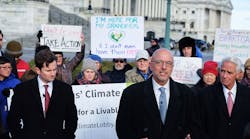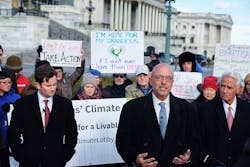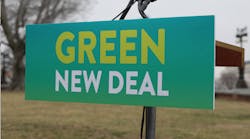When I disparaged the efficacy of the Green New Deal last February, I violated one of my own cardinal rules: Don’t bring a problem without bringing a solution.
I failed to offer another solution.
But now, there is other legislation pending in Congress that does offer more realistic policy solutions to the climate crisis. Although several efforts have been made over the years to pass a national carbon cap and trade bill, none have been successful. An alternative to that type of carbon tax is a revenue-neutral carbon fee. A 2013 study conducted by Regional Economic Models, Inc. (REMI) found that putting a price on pollution, and returning those dollars directly to Americans, would have a positive effect on the climate and the economy. REMI estimated that it could significantly reduce carbon emissions, add jobs to the economy, and substantially reduce premature deaths linked to poor air quality.
The experts also suggest that, for such a mechanism to be effective, it would have to increase at a consistent and predictable rate. Well, H.R. 763, the Energy Innovation and Carbon Dividend Act of 2019 does all of those things. Originally introduced in both chambers of the previous Congress, it was reintroduced in the House of Representatives in January. It is a bipartisan bill that would create a Carbon Dividend Trust Fund, providing for a carbon fee to be assessed on fossil fuels (and other greenhouse gases), with 100 percent of the net revenue (fees less administrative costs) to be returned directly to American taxpayers and their families.
Rep. Ted Deutch (D-FL) is championing the bipartisan Carbon Dividend bill.
Proponents of the bill claim that it will reduce carbon emissions by 40 percent or more in its first 12 years, and create some 2.1 million new jobs. Because it pays for itself and, after administrative expenses – which are capped to prevent bureaucratic creep – returns the bulk of the fees to Americans. This would help offset the additional costs for transportation, energy, and commodities that will inevitably be passed on by producers, it is revenue neutral.
The mechanics of the bill are relatively straightforward. The fee on fossil fuels will start at $15 per ton of CO2 and increase annually, forcing both industries and consumers to become greener. The dividends will be allocated in equal shares every month, with no restrictions on how taxpayers can spend the money. The bill also protects U.S. companies and workers, since imported products are assessed a border carbon assessment and exported products receive a refund.
It may not be perfect, but it certainly make more sense than does the GND… without all of the media hype. (How many of you had even heard about this bill?). I urge you to get educated on this issue and, if you agree, then let your Representative know that you support "H.R. 763"!
A regular contributor to HPAC Engineering and a member of its editorial advisory board, the author is a principal at Sustainable Performance Solutions LLC, a south Florida-based engineering firm focusing on energy and sustainability.











